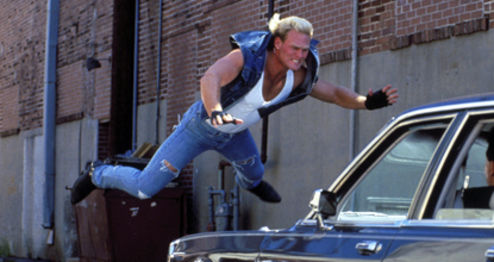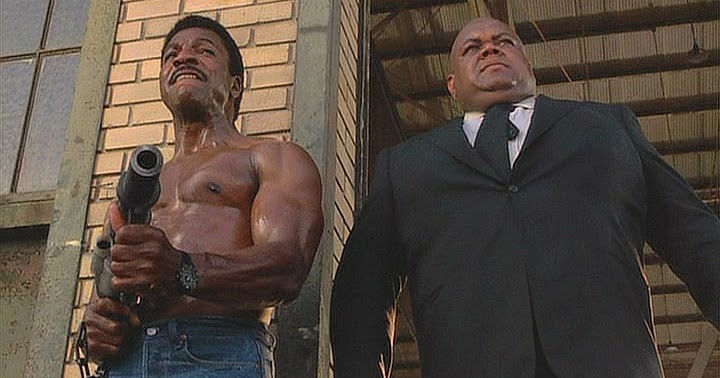Fuck You, Spaceman: The Ecstatic Action Cinema of Craig R. Baxley
- Brandon Streussnig
- Dec 24, 2021
- 7 min read
Updated: Jan 12, 2022

Thinking back on the action dominated '80s and early 90s - those halcyon days quarterbacked by impossibly muscled lunkheads - a fistful of filmmakers likely come to mind first: John McTiernan, James Cameron, John Woo (maybe Renny Harlin?). With works like Predator (1987), Terminator 2: Judgement Day (1991), and Hard Boiled (1992), their canonization is inarguable. However, there’s one name that should be counted amongst those greats. A name that shares ties not only to McTiernan, but also heavyweight gunfighter, Walter Hill. A name who gifted the world three action facemelters starring supposed “B-Listers” that rank alongside any of Arnie and Sly’s best.
That name is Craig Baxley.
Baxley didn’t make his directorial debut (Action Jackson [1988]) until the sun had already started to set on action’s aforementioned golden age, but by then he was already well established as the kind of steady hand you’d want on set. As a stuntman and coordinator, Baxley’s name appears all over 70s television staples like Dukes of Hazzard, M*A*S*H and Police Story. From there, he graduated to the big screen - primarily working as a stunt coordinator for Walter Hill. Nevertheless, it isn’t until he hooks up with McTiernan on Predator that you begin to realize there’s something special happening with Craig Baxley.

As the jungle alien massacre's Second Unit Director, Baxley helped deliver what, for
my money (and, according to current living legend Scott Adkins via the Action for Everyone podcast) might be the best pure set pieces ever committed to celluloid. Relentless gun fights, massive explosions, and a fantastic fight between Arnold and the titular hunter, Predator looks and moves like a literal beast. It’s about as perfect a calling card as one could hope for if they wanted to make the jump to directing a feature of their own.
Action Jackson is the first in a three-banger run where Baxley, fully formed and polished as hell, takes a guy primarily considered to be right below the A-list and re-molds his already exquisitely violent image. Fronted by Carl Weathers, Jackson moves like a pedestrian cop thriller on paper, yet Baxley quickly establishes himself as a primo mayhem proprietor. Plot, such as it is, is thin. Weathers’ cop - the terrifically named Sgt. Jericho Jackson - is embroiled in a private war with evil auto magnate Peter Dellaplane (Craig T. Nelson). Why? Because Jericho roughed up his sex pest son. So, now Dellaplane is determined to nail that bastard, going as far as to frame Jackson for the murder of his own bombshell wife (Sharon Stone).
No one’s really here for Machiavellian mechanics though, are they? It’s all about atmosphere and cartoonish carnage and Baxley seems to own a penchant for both in his marrow. Jackson belts out screamers like “HOW YA LIKE YOUR RIBS???” before torching a baddie with a flamethrower. Weathers is in peak physical condition, and boy does Baxley's lens love him. As if the screen weren't already on the verge of melting, Vanity shows up, playing a throaty, dope-addled foil for our rampaging hero. It’s a collection of gorgeous madness, brimming with tangible sexuality - the kind of shit that feels depressingly antiquated in modern action cinema.
Amidst Weather’s glistening abs, killer jabs and briefly mesmerizing early Stone performance, Baxley peppers in astonishing stuntwork that you can’t believe he’s pulling off on a budget much lower than mega producer Joel Silvers other pictures (hell, at $7 million, it's even half of Rowdy Herrington's Road House [1988]). Weathers tossing fools through windows and leaping onto cars would be exciting enough for most, but not Baxley. Long before The Fast and the Furious (2001) series was finding new ways to drive cars into and off of buildings, Baxley had Jackson drive his Pontiac Fiero into Dellaplane’s mansion, up the stairs and into the bedroom. It’s a legitimate jaw dropper of a stand alone gag, and a preview for the kind of stunts Baxley would pull just a few years later.

"Merry Christmas, motherfucker!”
That's the opening line of Baxley’s Jackson follow-up, Dark Angel (a/k/a I Come in Peace, 1991) and right away you know you’re in for another shot of joy. Perhaps the weakest of Baxley's defining trio, yet no less kinetic, Dark Angel follows Dolph Lundgren’s Detective Jack Caine as he investigates a gang of drug dealers. Paired with Special Agent Smith (funny man of the moment Brian Benben), Caine goes undercover into Houston’s underbelly. Unbeknownst to the hulking dick, he’s just entered into an intergalactic death hunt. Master criminal from another world, Talec (Matthias Hues), is racking up bodies while being pursued by ace space cop, Azeck (Jay Bilas). As you've already guessed, it’s only inevitable that Dolph and Talec find themselves on a beefy collision course.
Silly and frightening similarities to Predator 2 (also 1990) aside, Dark Angel is this writer's favorite brand of genre mashup. Taking a by-the-numbers cop thriller and tossing in aliens who kill using projectile Compact Discs, just so they can extract a chemical to use as space DMT on their home planet? Sure. Why not? It’s pretty wild stuff, plot-wise, but where Baxley really works his magic is in how manages to coalesce all these seemingly disparate threads into a mega-nerd quilt that (mostly) makes sense. Arguably none of Dark Angel should work, but like Action Jackson, it looks fantastic and possesses a true tangible quality, despite being about rogue murder aliens.
Baxley's biggest feat, though? Actually letting Dolph Lundgren be funny.
Dolph is a freak. The Swedish Adonis is the most strikingly gorgeous of his contemporaries, armed with a genius IQ, and a body cut from marble. In short, he’s a dreamboat. Dark Angel exists as a bit of an unsung turning point for him, though, because prior to it, he wasn’t really allowed to show off his lighter side. Dropping one liners (including maybe the finest send-off of all time) like it’s nothing and cracking that killer smile, Dolph is having the time of his life as Caine.
Baxley’s leads are often guys who weren’t quite marketable enough to front a major production, but he always got the kind of performances out of them that probably should’ve changed that. Hell, Rocky IV (1985) proved Dolph has presence for days. But in 1990, Lundgren had primarily been cast as brooding heavies (give or take a Red Scorpion [1988]). Sure, he’s great at that, but bless Baxley for seeing something a little more. Without Dark Angel, perhaps we don’t get Dolph cracking jokes with Brandon Lee in Mark Lester's Showdown in Little Tokyo (1991), or chewing scenery with JCVD in Universal Soldier (1992).

Visually binding Baxley’s miracle run together is his centering of a hulking, gorgeous brute with a bit of soft, erudite side, living in the nicest apartment you’ve ever seen. No one embodies that better than Brian Bosworth as Joe Huff, and no film embodies Craig Baxley's ethos better than Stone Cold (1991). Like Rock Hudson and Douglas Sirk, Bosworth was practically molded from clay to play a Baxley lead. As Joe Huff, he lumbers through a burnt out Mississippi, blonde mullet flowing in the balmy breeze, oversized earring dangling. He’s a meathead work of art astride his chopper, boring a hole into your soul behind comically tiny sunglasses.
In Baxley’s Mississippi, white supremacist bikers rule the streets like a backwater Mad Max (1979) sect, and only Huff (undercover alias: John Stone) can stop them. Led by a cool as ice Lance Henriksen and a psychotic Bill Forsythe, the gang has been killing government agents without mercy. Their endgame is to storm the state capital building, spring one of their brothers during his trial, and murder not only the DA, but also the State Supreme Court Justices. Talk about ambition. In 1991, Craig Baxley practically predicted the January 6th Capitol Riot, only he may have slightly overshot how exciting something like that would actually look.
After making $5 mil look like $15 million in his previous films, Baxley was given big boy money ($25 mil) with a star-in-the-making to do anything his unhinged mind could conjure. And boy did he ever conjure. Stone Cold is a revelation and as striking as any of its contemporaries. Mississippi feels like a post-apocalyptic wasteland, where leather clad freaks reign supreme and beach pit fights between mutant muscle men are an everyday occurrence [Editor's Question: is it not?]. The costuming is out of this world, featuring fashions falling into a nebulous void somewhere between '87 and '92. It’s a total nightmare, but it’s simultaneously stunning.
Stone Cold also features the single greatest stunt I’ve ever seen put to film. You can keep Tom Cruise scaling the Burj Khalifa because, as impressive as that is, it’s got all the resources in the world to make it as safe as possible. That’s never to say Baxley wasn’t safe, the man plied his trade as a stuntman for decades. Still, the climax of the film is punctuated by a motorcycle flying out of a capitol building window and exploding mid-air into a levitating helicopter. It’s astonishing and it feels like every stunt, explosion, gunfight and car chase Baxley ever had a hand in was leading up to this moment. Not only is it a perfect punctuation to the wild gamble that is Stone Cold, it’s an ecstatic final panel in Baxley’s action triptych.

“Gamble” is the key word, because in hindsight, having Baxley’s foray into the majors also being a vehicle for a legendary NFL bust’s attempt at big screen stardom feels remarkably silly (at best). Stone Cold bombed, Bosworth never hit it big, and Craig Baxley never got anywhere near that kind of budget again. “Heartbreak” feels a little dramatic but to lose a guy like that’s talents to middling TV movies and Stephen King adaptations no one remembers feels wrong.
The gut punch hits harder because Stone Cold is great! Its reputation as a good “bad” movie is short-selling a bona fide ripper. Baxley squeezed every dime out of that budget and it absolutely shows. Stone Cold's biggest misfortune was arriving the same year James Cameron redefined the very nature of action cinema. We rightfully remember Terminator 2 as the juggernaut it is, while Stone Cold is forever destined to be the hidden gem waiting under a pile of rubble, ready to blow someone’s mind.
Craig Baxley never got his due as one of the premiere auteurs of action cinema’s golden age, but his legacy is alive and well. If you scroll the right side of Twitter long enough, you’ll stumble into a community of folks singing the praises of DTV superstars like Jesse V. Johnson, Isaac Florentine and Liam O’Donnell. Pop in Ninja II (2014) or Skylines (2020) and you'll realize Baxley's spirit never left his modern cinematic brothers. While it would've been great to get ten more meathead masterworks like Stone Cold or Dark Angel, his work helped inspired a new golden age in action. All you have to do is veer slightly left from the Netflix queue to find it.
Brandon Streussnig is a freelance writer whose work has appeared in The Playlist, The Movie Sleuth, and Film Combat Syndicate.



Comments